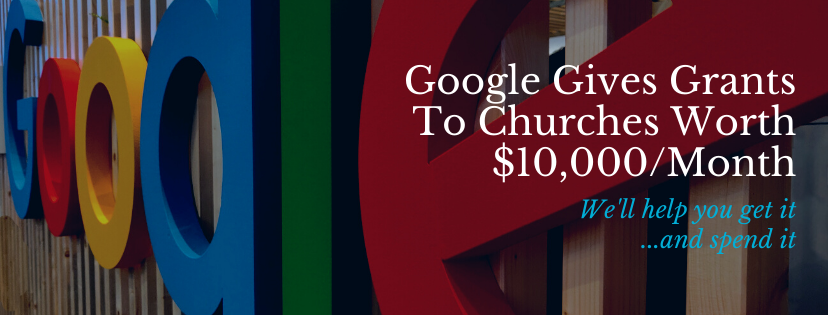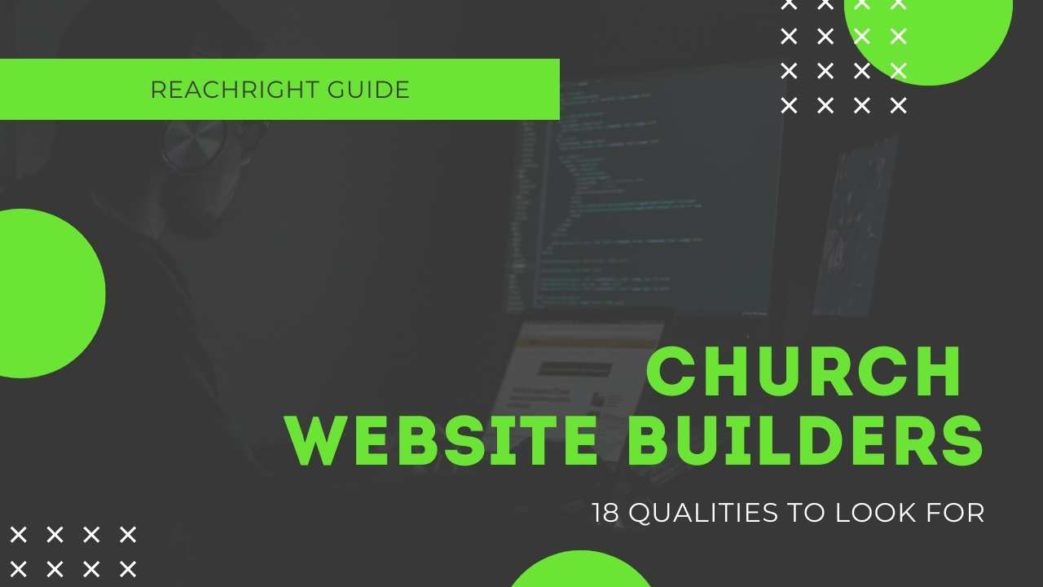With so many options to design your church’s site, how do you know how to find the best church website builder?
From free DIY tools to professional builders, there are seemingly endless options. The good news is the best builders have qualities that stand out from the rest.
Your church deserves the best possible home online. Make a great first impression and provide an incredible user experience by picking the right builder for your site.

1. Create A Professional Church Website
The single most important quality of a great church website builder is you’re able to get a professional church website. This means you’re not just getting stuck with the same tired themes that hundreds of other churches or websites are already using.
When your site looks like a cookie-cutter version of something a visitor’s already seen before, it doesn’t make the best first impression. Sadly, many builders use a handful of templates for every site they make. The same happens with most free DIY builders too.
Your church’s site should look clean, professional and unique to your church.
2. Easy To Maintain Sites
The last thing you want is to make maintaining your church website a time-consuming chore. However, some builders make it difficult to make any real changes without asking for help. Any simple layout changes might equal costly changes by the developer.
Instead, opt for a church website builder that designs your site to make it as easy as possible to maintain. If you want to slightly adjust the header, change the layout a bit, update content, or any other normal tasks, it’s easy to do, even if you’re brand new to managing a website.
This is why many builders use WordPress as it has a more intuitive back-end for managing content, users, plugins, and more.
3. Full Control Over The Design
This is an all too-common problem. In fact, it’s become so normal that some web design experts say most websites end up looking the same. Of course, it’s quick and easy for a church website builder to just grab a template, fill in your content and be done.
However, just having different content isn’t enough for your church’s site to stand out. Your church needs a builder that gives you full control over the design while offering up their expertise to fine tune it. This is why it’s a good idea to check out sites you like. Take a mix and match approach to creating a truly unique site versus just another generic site that visitors have seen before.
4. Designed For Churches
This one might sound odd, but a church website builder that focuses on church websites is going to be much easier to work with. There’s nothing inherently wrong with generic builders and developers. However, every industry has their own unique needs.
By working with someone who already has extensive experience working with churches, you don’t have to explain everything. They already know the importance of having certain pages, functions and features.
They’ll also have recommendations on the best themes, plugins, and integrations to help grow your church. Plus, the process is often easier for both parties.
5. Includes Member Registration
While you may decide you don’t actually need this, having a builder that’s able to incorporate secure member registration is a plus. This encompasses several different things, including:
- A membership area just for your church members to socialize and get updates
- A section of your site for visitors to sign up to interact on forums, get access to special resources, check out archived content and more
- People registering for special events, including both online and offline events
Having member areas expands the possibilities for your church’s site. Even if you don’t need it now, you may in the future.

6. Online Tithing Options
Churches need an easy way for members and visitors to tithe online. While there are some wonderful online tithing providers, you need an area of your site to tie in these giving forms.
Of course, you can offer your own tithing portal for donors to keep track of what they’ve given, set up recurring giving and give to special areas of your ministry. Whether you go with a giving provider or create your own, you need an area that explains the importance of tithing, your church’s process and provides a secure form for giving.
7. Calendar Or Events Management
Since you’ll likely have plenty of events scheduled, your site needs to reflect those. Work with a church website builder that includes a calendar or event management tool. It should be something easy for you to update and manage.
Often, a plugin or extension works well for this purpose. But, having a builder that already knows which plugins will work best for your church saves you time.
8. Integrates With Existing Church Software
If you already use certain church software to manage your church, it should tie into your church website, if applicable. For instance, tithing details might tie into your accounting software. Or your calendar tool might tie into the calendar on your church website.
Anytime you can tie your tools together, you streamline your daily tasks. That gives you more time to focus on other areas of your church.
9. Responsive Design
Responsive design isn’t a new trend. In fact, it’s been a Google ranking factor for years. With more people than ever using mobile devices, your church needs a site that’s compatible with those devices. Since you definitely don’t want to design a different site for different screen sizes, responsive design is the way to go.
While some builders want to charge extra for this, reputable builders include by default. After all, they want to create a site that truly benefits you. Google uses responsive design to determine if your site’s a good fit for users on tablets and smartphones.
Improve your SEO and get a site that gives visitors a more enjoyable experience just by ensuring a builder includes this.
10. Includes Social Sharing Options
Social media has become a great tool for marketing your church, especially with all the free tools available. Let your visitors help with the marketing by including social sharing options on your church website.
Your church website builder should offer a variety of ways to incorporate social media sharing. From creating a theme that adds social share buttons to your blog posts automatically to including your church’s social media profile links in the footer, you want to have social media built in.

11. Reliable Customer Support
This is actually one of the most important qualities of a great church website builder. You need someone you can count on when you have an issue. For instance, if a section of your site isn’t working correctly, you want to be able to call, get a person and have someone start working on the issue as soon as possible.
Some builders only have very limited support. Others provide full support in a variety of ways, such as chat, phone and email.
You also want a builder you can contact during the process. Whether you’re working with a professional or a DIY option, you need to stay in contact. For professionals, you want to know how things are progressing. For DIY builders, you may run into problems and need help figuring things out.
12. Simple To Upgrade
Every single website needs an upgrade at some point. In fact, regular upgrades are a good idea to keep your site safe, looking great and remaining compatible with newer technology.
If your site isn’t easy to upgrade, it could easily become more trouble than anything else. It may also lead you to either never upgrading or just getting rid of your church’s site.
It’s a good idea to have a site that you can perform at least some upgrades on by yourself, such as installing security patches. But, you’ll want to be able to contact the builder for more advanced upgrades, like a major design overhaul.
13. Upload Sermons
To increase engagement and expand your church’s reach, upload your sermons on your church’s website. Of course, this means you need a builder that can create a video section that’s easy to manage.
You’ll need to create a layout that displays your most current sermons along with descriptions that make it easy for search engines to pick up what your videos are about. Then, you’ll need a search feature for visitors to find older sermons based on keywords and themes.
14. Easy To Use Media Upload And Management
Speaking of videos, you need a site that makes uploading and managing all of your media content simple. Images and videos are great for adding a more storytelling aspect to your church’s site. They engage visitors and break up long sections of text.
Your church’s site needs a way to upload media, resize it and place it in the exact place you need. And your builder should make it easy enough that it doesn’t require any special coding to do it.
15. Use Your Own Domain
This is mainly only if you use a DIY church website builder. Anytime you use subdomains that come from a free builder, you’ll have a harder time showing up in search results. This is because the subdomain doesn’t relate to your church’s site. An example of this type of subdomain would be yourchurch.freebuilder.com. Without paying a fee, you can’t change the “freebuilder” part.

Work with a builder than helps you get your own domain. Whether you register it yourself or not, your builder will help walk you through the process if you’re new to it. All this means is you’ll skip the subdomain and get a website that’s all your own with an address like yourchurch.com.
16. Has All The Pages You Need
Of course, you want a church website builder that includes all the main pages your church’s site needs. Some might give you a simple template that just has a home page, about us page and a blog. It’s a good start, but not nearly enough.
Every church needs at least six main pages. You’ll also need a blog to continually engage your site’s visitors. Without these, you’re not giving your visitors enough information about your church. Having all of these included by default helps your rank and engagement factors.
This is another reason to work with a builder that has experience with churches. They likely already have some basic templates with the most important pages. Then, they can build and customize these to give you the exact site you’re looking for.
17. Affordable
Price is important when it comes to picking the right builder for your church website. If you’re a smaller church, you might not have the budget for a site that costs thousands of dollars. But, that doesn’t mean you have to settle for the cheapest option available, especially when it doesn’t offer everything you need.
Instead, look for something in the middle. An affordable church website can still be incredibly professional and help grow your church online and off.
18. Free Church Website Builder Vs Professional
In the end, you have too main choices. You can opt for a church website builder that’s free or extremely cheap or a professional designer.
With the former, you do everything yourself. These are usually drag and drop templates with limited options. They are great for small budgets, but won’t offer the customization and features that you might need. Customer support is usually scarce unless you pay for a premium monthly plan. Plus, you’ll also need to buy a domain name. The builder often hosts your site too, but your traffic is capped along with your storage space for images and videos.
With a professional, your site looks more polished. It may take a little longer, but you’ll get a custom site versus a few limited templates. Plus, you’ll be guaranteed to get all of the features your site needs to be successful.
Yes, this does cost more, but you don’t have to handle any of the design and coding parts yourself. Plus, you get more reliable customer support. If you need upgrades, it’s much easier as well. DIY builders may not offer the newest upgrades for months or years.
Plus, professionals typically have a much better reputation. Naturally, always check online for reviews and check out the builder’s portfolio to get the right builder for you.
Looking for the right church website builder that focuses specifically on churches? Look no further than REACHRIGHT. Contact us today to discuss your church website.




